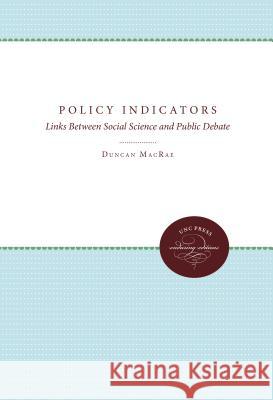Policy Indicators: Links Between Social Science and Public Debate » książka
Policy Indicators: Links Between Social Science and Public Debate
ISBN-13: 9780807865651 / Angielski / Miękka / 2011 / 432 str.
Duncan MacRae analyzes the ways in which experts can aid a political community in choosing public statistics for citizens to use in making policy judgments. In contrast to the study of social indicators, which has emphasized descriptions and models of social change, he stresses that the relevant measures should be selected in view of their potential applications.
The usefulness of a public statistical series depends on the goals it represents and on our knowledge of how to act collectively to achieve those ends. The measures chosen, MacRae notes, can include gauges of social objectives, such as health and education improvements or crime reduction, and administrative inputs that promote them. He recommends, however, that the measures should be organized around general ends such as net economic benefit, subjective well-being, and equity. Knowledge about how to further collective aims, MacRae contends, requires strenthening of "technical communities" of researchers who study the means to the ends that policy indicators measure.
Policy Indicators provides a critical review of the field of social indicators, stressing the uses of statistics in policy debate. For applied social scientists and policy analysts, it presents broad proposals for the roles of their fields in a democracy.
Originally published in 1985.
A UNC Press Enduring Edition -- UNC Press Enduring Editions use the latest in digital technology to make available again books from our distinguished backlist that were previously out of print. These editions are published unaltered from the original, and are presented in affordable paperback formats, bringing readers both historical and cultural value.
Duncan MacRae analyzes the ways in which experts can aid a political community in choosing public statistics for citizens to use in making policy judgments. In contrast to the study of social indicators, which has emphasized descriptions and models of so











